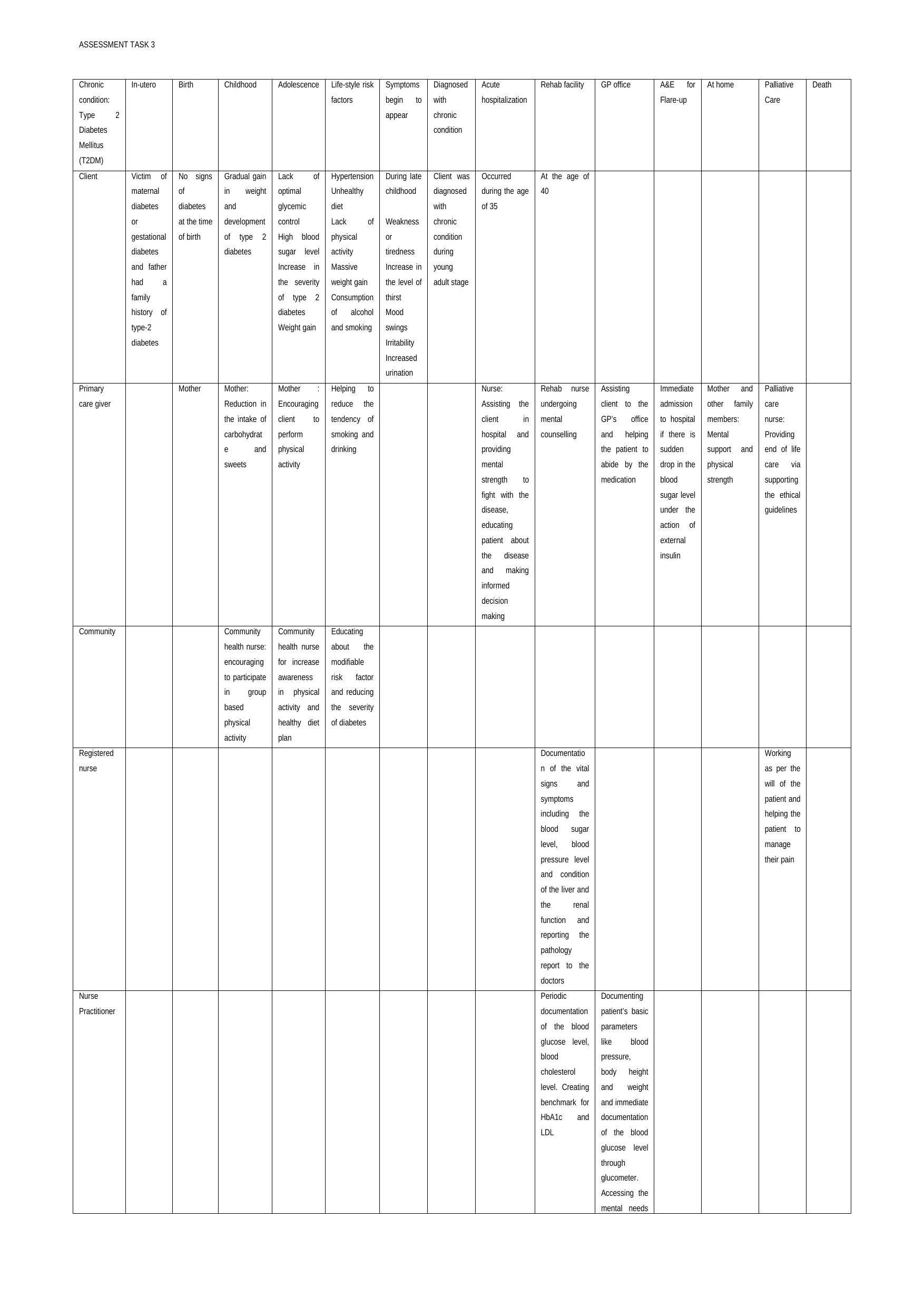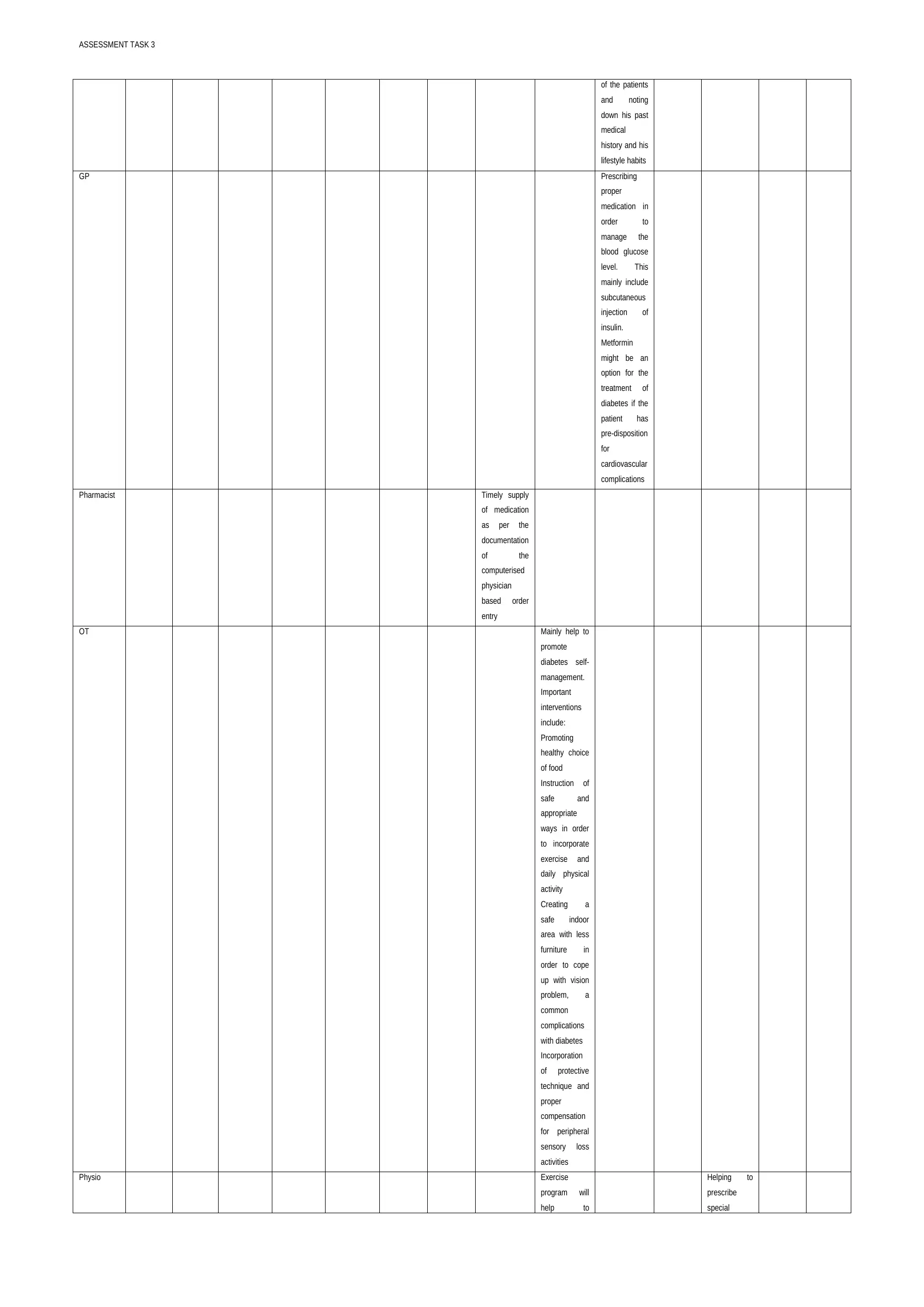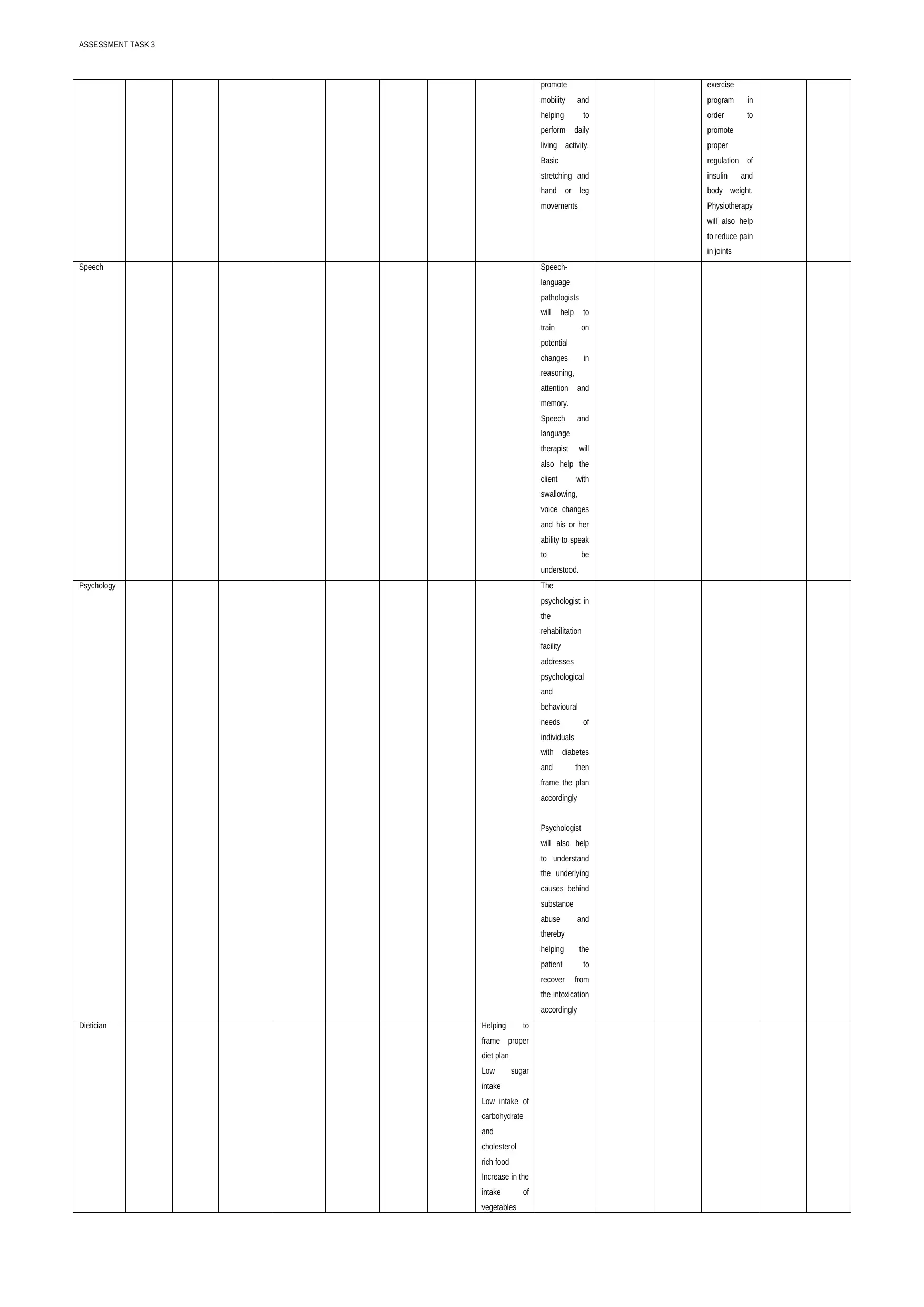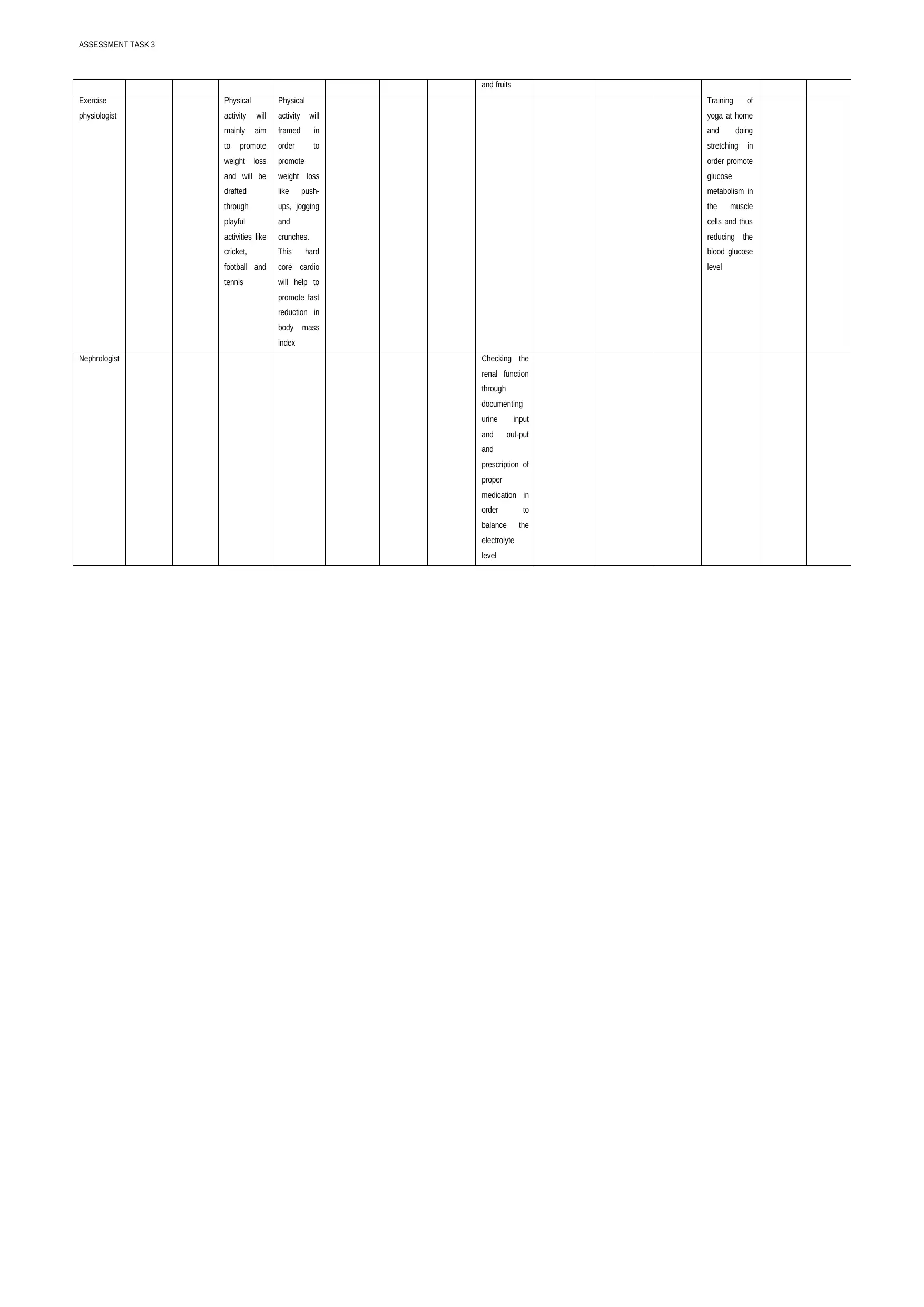Chronic Disease Management: Assessment Task 3, Trajectory Matrix
VerifiedAdded on 2023/06/03
|6
|1147
|372
Project
AI Summary
This assessment task presents a comprehensive chronic disease management matrix, focusing on a patient with Type 2 Diabetes Mellitus (T2DM). The matrix details the patient's trajectory from in-utero conditions through childhood and adolescence, highlighting lifestyle risk factors, symptoms, and acute factors leading to diagnosis and hospitalization. It outlines the roles of various healthcare professionals, including primary care givers, nurses, community health nurses, GPs, pharmacists, occupational therapists, physiotherapists, speech therapists, psychologists, and dieticians, in managing the patient's condition. The matrix also covers the patient's needs, from physical care to mental and palliative support, including the use of medication and lifestyle interventions. The assignment emphasizes rehabilitation principles, supportive responses to the patient and family, and the need for seamless transitions of care. A detailed bibliography supports the clinical management strategies discussed, with references to key guidelines and research articles on diabetes care and management.

Running head: ASSESSMENT TASK 3
Assessment Task: 3
Name of the Student
Name of the University
Author Note
Assessment Task: 3
Name of the Student
Name of the University
Author Note
Paraphrase This Document
Need a fresh take? Get an instant paraphrase of this document with our AI Paraphraser

ASSESSMENT TASK 3
Chronic
condition:
Type 2
Diabetes
Mellitus
(T2DM)
In-utero Birth Childhood Adolescence Life-style risk
factors
Symptoms
begin to
appear
Diagnosed
with
chronic
condition
Acute
hospitalization
Rehab facility GP office A&E for
Flare-up
At home Palliative
Care
Death
Client Victim of
maternal
diabetes
or
gestational
diabetes
and father
had a
family
history of
type-2
diabetes
No signs
of
diabetes
at the time
of birth
Gradual gain
in weight
and
development
of type 2
diabetes
Lack of
optimal
glycemic
control
High blood
sugar level
Increase in
the severity
of type 2
diabetes
Weight gain
Hypertension
Unhealthy
diet
Lack of
physical
activity
Massive
weight gain
Consumption
of alcohol
and smoking
During late
childhood
Weakness
or
tiredness
Increase in
the level of
thirst
Mood
swings
Irritability
Increased
urination
Client was
diagnosed
with
chronic
condition
during
young
adult stage
Occurred
during the age
of 35
At the age of
40
Primary
care giver
Mother Mother:
Reduction in
the intake of
carbohydrat
e and
sweets
Mother :
Encouraging
client to
perform
physical
activity
Helping to
reduce the
tendency of
smoking and
drinking
Nurse:
Assisting the
client in
hospital and
providing
mental
strength to
fight with the
disease,
educating
patient about
the disease
and making
informed
decision
making
Rehab nurse
undergoing
mental
counselling
Assisting
client to the
GP’s office
and helping
the patient to
abide by the
medication
Immediate
admission
to hospital
if there is
sudden
drop in the
blood
sugar level
under the
action of
external
insulin
Mother and
other family
members:
Mental
support and
physical
strength
Palliative
care
nurse:
Providing
end of life
care via
supporting
the ethical
guidelines
Community Community
health nurse:
encouraging
to participate
in group
based
physical
activity
Community
health nurse
for increase
awareness
in physical
activity and
healthy diet
plan
Educating
about the
modifiable
risk factor
and reducing
the severity
of diabetes
Registered
nurse
Documentatio
n of the vital
signs and
symptoms
including the
blood sugar
level, blood
pressure level
and condition
of the liver and
the renal
function and
reporting the
pathology
report to the
doctors
Working
as per the
will of the
patient and
helping the
patient to
manage
their pain
Nurse
Practitioner
Periodic
documentation
of the blood
glucose level,
blood
cholesterol
level. Creating
benchmark for
HbA1c and
LDL
Documenting
patient’s basic
parameters
like blood
pressure,
body height
and weight
and immediate
documentation
of the blood
glucose level
through
glucometer.
Accessing the
mental needs
Chronic
condition:
Type 2
Diabetes
Mellitus
(T2DM)
In-utero Birth Childhood Adolescence Life-style risk
factors
Symptoms
begin to
appear
Diagnosed
with
chronic
condition
Acute
hospitalization
Rehab facility GP office A&E for
Flare-up
At home Palliative
Care
Death
Client Victim of
maternal
diabetes
or
gestational
diabetes
and father
had a
family
history of
type-2
diabetes
No signs
of
diabetes
at the time
of birth
Gradual gain
in weight
and
development
of type 2
diabetes
Lack of
optimal
glycemic
control
High blood
sugar level
Increase in
the severity
of type 2
diabetes
Weight gain
Hypertension
Unhealthy
diet
Lack of
physical
activity
Massive
weight gain
Consumption
of alcohol
and smoking
During late
childhood
Weakness
or
tiredness
Increase in
the level of
thirst
Mood
swings
Irritability
Increased
urination
Client was
diagnosed
with
chronic
condition
during
young
adult stage
Occurred
during the age
of 35
At the age of
40
Primary
care giver
Mother Mother:
Reduction in
the intake of
carbohydrat
e and
sweets
Mother :
Encouraging
client to
perform
physical
activity
Helping to
reduce the
tendency of
smoking and
drinking
Nurse:
Assisting the
client in
hospital and
providing
mental
strength to
fight with the
disease,
educating
patient about
the disease
and making
informed
decision
making
Rehab nurse
undergoing
mental
counselling
Assisting
client to the
GP’s office
and helping
the patient to
abide by the
medication
Immediate
admission
to hospital
if there is
sudden
drop in the
blood
sugar level
under the
action of
external
insulin
Mother and
other family
members:
Mental
support and
physical
strength
Palliative
care
nurse:
Providing
end of life
care via
supporting
the ethical
guidelines
Community Community
health nurse:
encouraging
to participate
in group
based
physical
activity
Community
health nurse
for increase
awareness
in physical
activity and
healthy diet
plan
Educating
about the
modifiable
risk factor
and reducing
the severity
of diabetes
Registered
nurse
Documentatio
n of the vital
signs and
symptoms
including the
blood sugar
level, blood
pressure level
and condition
of the liver and
the renal
function and
reporting the
pathology
report to the
doctors
Working
as per the
will of the
patient and
helping the
patient to
manage
their pain
Nurse
Practitioner
Periodic
documentation
of the blood
glucose level,
blood
cholesterol
level. Creating
benchmark for
HbA1c and
LDL
Documenting
patient’s basic
parameters
like blood
pressure,
body height
and weight
and immediate
documentation
of the blood
glucose level
through
glucometer.
Accessing the
mental needs

ASSESSMENT TASK 3
of the patients
and noting
down his past
medical
history and his
lifestyle habits
GP Prescribing
proper
medication in
order to
manage the
blood glucose
level. This
mainly include
subcutaneous
injection of
insulin.
Metformin
might be an
option for the
treatment of
diabetes if the
patient has
pre-disposition
for
cardiovascular
complications
Pharmacist Timely supply
of medication
as per the
documentation
of the
computerised
physician
based order
entry
OT Mainly help to
promote
diabetes self-
management.
Important
interventions
include:
Promoting
healthy choice
of food
Instruction of
safe and
appropriate
ways in order
to incorporate
exercise and
daily physical
activity
Creating a
safe indoor
area with less
furniture in
order to cope
up with vision
problem, a
common
complications
with diabetes
Incorporation
of protective
technique and
proper
compensation
for peripheral
sensory loss
activities
Physio Exercise
program will
help to
Helping to
prescribe
special
of the patients
and noting
down his past
medical
history and his
lifestyle habits
GP Prescribing
proper
medication in
order to
manage the
blood glucose
level. This
mainly include
subcutaneous
injection of
insulin.
Metformin
might be an
option for the
treatment of
diabetes if the
patient has
pre-disposition
for
cardiovascular
complications
Pharmacist Timely supply
of medication
as per the
documentation
of the
computerised
physician
based order
entry
OT Mainly help to
promote
diabetes self-
management.
Important
interventions
include:
Promoting
healthy choice
of food
Instruction of
safe and
appropriate
ways in order
to incorporate
exercise and
daily physical
activity
Creating a
safe indoor
area with less
furniture in
order to cope
up with vision
problem, a
common
complications
with diabetes
Incorporation
of protective
technique and
proper
compensation
for peripheral
sensory loss
activities
Physio Exercise
program will
help to
Helping to
prescribe
special
⊘ This is a preview!⊘
Do you want full access?
Subscribe today to unlock all pages.

Trusted by 1+ million students worldwide

ASSESSMENT TASK 3
promote
mobility and
helping to
perform daily
living activity.
Basic
stretching and
hand or leg
movements
exercise
program in
order to
promote
proper
regulation of
insulin and
body weight.
Physiotherapy
will also help
to reduce pain
in joints
Speech Speech-
language
pathologists
will help to
train on
potential
changes in
reasoning,
attention and
memory.
Speech and
language
therapist will
also help the
client with
swallowing,
voice changes
and his or her
ability to speak
to be
understood.
Psychology The
psychologist in
the
rehabilitation
facility
addresses
psychological
and
behavioural
needs of
individuals
with diabetes
and then
frame the plan
accordingly
Psychologist
will also help
to understand
the underlying
causes behind
substance
abuse and
thereby
helping the
patient to
recover from
the intoxication
accordingly
Dietician Helping to
frame proper
diet plan
Low sugar
intake
Low intake of
carbohydrate
and
cholesterol
rich food
Increase in the
intake of
vegetables
promote
mobility and
helping to
perform daily
living activity.
Basic
stretching and
hand or leg
movements
exercise
program in
order to
promote
proper
regulation of
insulin and
body weight.
Physiotherapy
will also help
to reduce pain
in joints
Speech Speech-
language
pathologists
will help to
train on
potential
changes in
reasoning,
attention and
memory.
Speech and
language
therapist will
also help the
client with
swallowing,
voice changes
and his or her
ability to speak
to be
understood.
Psychology The
psychologist in
the
rehabilitation
facility
addresses
psychological
and
behavioural
needs of
individuals
with diabetes
and then
frame the plan
accordingly
Psychologist
will also help
to understand
the underlying
causes behind
substance
abuse and
thereby
helping the
patient to
recover from
the intoxication
accordingly
Dietician Helping to
frame proper
diet plan
Low sugar
intake
Low intake of
carbohydrate
and
cholesterol
rich food
Increase in the
intake of
vegetables
Paraphrase This Document
Need a fresh take? Get an instant paraphrase of this document with our AI Paraphraser

ASSESSMENT TASK 3
and fruits
Exercise
physiologist
Physical
activity will
mainly aim
to promote
weight loss
and will be
drafted
through
playful
activities like
cricket,
football and
tennis
Physical
activity will
framed in
order to
promote
weight loss
like push-
ups, jogging
and
crunches.
This hard
core cardio
will help to
promote fast
reduction in
body mass
index
Training of
yoga at home
and doing
stretching in
order promote
glucose
metabolism in
the muscle
cells and thus
reducing the
blood glucose
level
Nephrologist Checking the
renal function
through
documenting
urine input
and out-put
and
prescription of
proper
medication in
order to
balance the
electrolyte
level
and fruits
Exercise
physiologist
Physical
activity will
mainly aim
to promote
weight loss
and will be
drafted
through
playful
activities like
cricket,
football and
tennis
Physical
activity will
framed in
order to
promote
weight loss
like push-
ups, jogging
and
crunches.
This hard
core cardio
will help to
promote fast
reduction in
body mass
index
Training of
yoga at home
and doing
stretching in
order promote
glucose
metabolism in
the muscle
cells and thus
reducing the
blood glucose
level
Nephrologist Checking the
renal function
through
documenting
urine input
and out-put
and
prescription of
proper
medication in
order to
balance the
electrolyte
level

ASSESSMENT TASK 3
Bibliography
American Diabetes Association. (2015). Standards of medical care in diabetes—2015 abridged for primary care providers. Clinical diabetes: a publication of the American Diabetes Association, 33(2), 97.
Crume, T. L., Andrews, J. S., D’Agostino, R. B., Pettitt, D. J., Mayer-Davis, E. J., Law, J. R., ... & Rodriguez, B. L. (2013). The influence of exposure to maternal diabetes in utero on the rate of decline in β-cell function among youth with
diabetes. Journal of Pediatric Endocrinology and Metabolism, 26(7-8), 721-727.
Evert, A. B., Boucher, J. L., Cypress, M., Dunbar, S. A., Franz, M. J., Mayer-Davis, E. J., ... & Yancy, W. S. (2014). Nutrition therapy recommendations for the management of adults with diabetes. Diabetes care, 37(Supplement 1), S120-
S143.
Fritz, H. (2014). The influence of daily routines on engaging in diabetes self-management. Scandinavian journal of occupational therapy, 21(3), 232-240.
Pulgaron, E. R., & Delamater, A. M. (2014). Obesity and type 2 diabetes in children: epidemiology and treatment. Current diabetes reports, 14(8), 508.
Richardson, G. C., Derouin, A. L., Vorderstrasse, A. A., Hipkens, J., & Thompson, J. A. (2014). Nurse practitioner management of type 2 diabetes. The Permanente Journal, 18(2), e134.
Bibliography
American Diabetes Association. (2015). Standards of medical care in diabetes—2015 abridged for primary care providers. Clinical diabetes: a publication of the American Diabetes Association, 33(2), 97.
Crume, T. L., Andrews, J. S., D’Agostino, R. B., Pettitt, D. J., Mayer-Davis, E. J., Law, J. R., ... & Rodriguez, B. L. (2013). The influence of exposure to maternal diabetes in utero on the rate of decline in β-cell function among youth with
diabetes. Journal of Pediatric Endocrinology and Metabolism, 26(7-8), 721-727.
Evert, A. B., Boucher, J. L., Cypress, M., Dunbar, S. A., Franz, M. J., Mayer-Davis, E. J., ... & Yancy, W. S. (2014). Nutrition therapy recommendations for the management of adults with diabetes. Diabetes care, 37(Supplement 1), S120-
S143.
Fritz, H. (2014). The influence of daily routines on engaging in diabetes self-management. Scandinavian journal of occupational therapy, 21(3), 232-240.
Pulgaron, E. R., & Delamater, A. M. (2014). Obesity and type 2 diabetes in children: epidemiology and treatment. Current diabetes reports, 14(8), 508.
Richardson, G. C., Derouin, A. L., Vorderstrasse, A. A., Hipkens, J., & Thompson, J. A. (2014). Nurse practitioner management of type 2 diabetes. The Permanente Journal, 18(2), e134.
⊘ This is a preview!⊘
Do you want full access?
Subscribe today to unlock all pages.

Trusted by 1+ million students worldwide
1 out of 6
Related Documents
Your All-in-One AI-Powered Toolkit for Academic Success.
+13062052269
info@desklib.com
Available 24*7 on WhatsApp / Email
![[object Object]](/_next/static/media/star-bottom.7253800d.svg)
Unlock your academic potential
Copyright © 2020–2026 A2Z Services. All Rights Reserved. Developed and managed by ZUCOL.





